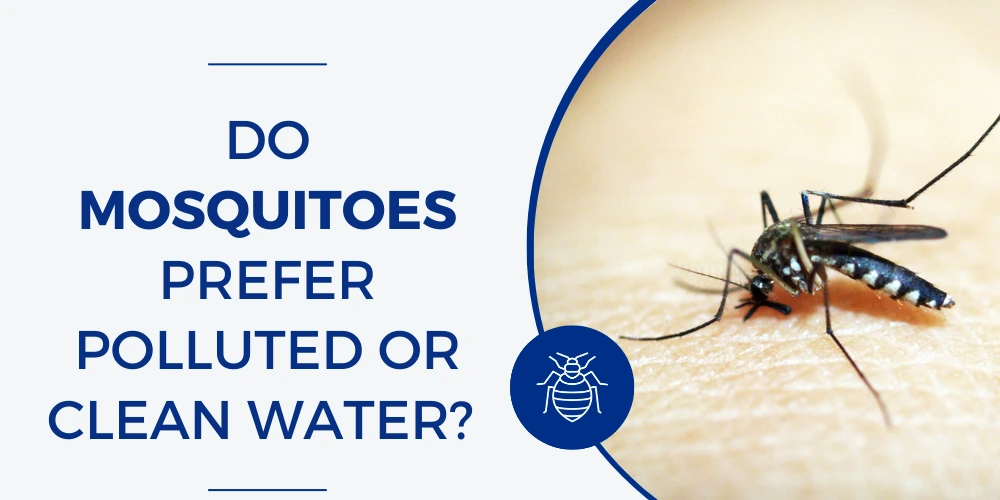If you’ve lived through a Phoenix summer, you already know: mosquitoes can turn a backyard BBQ into a swatting contest real quick. What many Valley homeowners don’t realize is that it’s not just any standing water that attracts them, it's the type of water that makes all the difference.
Whether it’s a clean birdbath or a dirty storm drain, mosquito larvae in water can multiply fast and put your family at risk of bites and disease.
So, do mosquitoes prefer polluted or clean water? The truth is both. And that’s where it gets tricky for Arizona homeowners. Let’s break it down.
Where Do Mosquitoes Breed?
Mosquitoes lay their eggs in standing water, and once hatched, you’ll often spot mosquito larvae in stagnant water, those tiny, wriggling “wigglers” that dart around just under the surface.
- Clean water: Found in things like birdbaths, fountains, pet bowls, and even swimming pools if left uncovered.
- Polluted or stagnant water: Places like storm drains, clogged gutters, and dirty ponds, where organic debris collects.
While we might assume “dirty” water is the main culprit, some mosquito species actually prefer fresh, clean water, so neither type is safe to ignore.
Polluted vs Clean Water – Breeding Preferences
Here’s how different mosquito species in Arizona behave:
| Water Type | Typical Species | Disease Risk | Common Phoenix Sources |
| Polluted/Stagnant | Culex mosquitoes (linked to West Nile virus) | High | Storm drains, dirty ponds, and irrigation runoff |
| Clean/Fresh | Aedes mosquitoes (linked to Dengue, Zika) | High | Birdbaths, buckets, uncovered pools, rain barrels |
Bottom line? Both types of water are dangerous breeding grounds just for different mosquito species.
Signs of Mosquito Presence Around Your Home
Not sure if you’re dealing with a mosquito problem? Watch for these signs:
- Larvae (“wigglers”) in standing water tiny, wormlike movements just under the surface.
- Buzzing sounds at dusk and dawn near your yard.
- Daytime bites (especially ankles and legs), a sign of Aedes mosquitoes.
- Clusters of adults resting in shaded corners like under patio furniture or shrubs.
- Noticeable increase after monsoon rains or irrigation leaks.
Learn the 5 signs of a mosquito infestation in Phoenix
Why This Matters for Disease Spread
- Polluted water breeders (Culex): These mosquitoes are tied to West Nile virus and encephalitis. Maricopa County reported higher cases after heavy summer rains created extra pools of stagnant water.
- Clean water breeders (Aedes): These are the ones you’ve heard about in connection with Dengue and Zika. Unlike many species, they bite during the day so even a sunny afternoon in the backyard isn’t safe if they’re around.
Either way, ignoring that puddle or birdbath could mean inviting disease-spreading pests right into your yard.
How Arizona’s Weather Makes It Worse
Phoenix’s hot climate plus monsoon season, is basically a five-star resort for mosquitoes. Add in:
- Overwatering and irrigation leaks
- Uncovered pools and fountains
- Landscaping features like ponds
…and you’ve got a recipe for nonstop mosquito activity.
That’s why mosquito control in Phoenix, AZ, is more than just a summertime chore; it’s a year-round job.
DIY Mosquito Control Methods at Home
Luckily, keeping mosquitoes in check is doable with some simple habits:
- Refresh standing water weekly (birdbaths, pet bowls, fountains).
- Use spray for mosquitoes around patios, lawns, and shady corners.
- Apply mosquito granules in damp soil areas.
- Plant mosquito-repelling plants like citronella or lemongrass.
- Install basic screens on windows and patio doors.
More tips on how to eliminate mosquitoes here.
Tools to Get Rid of Mosquitoes
At Bug & Weed Mart, you’ll find DIY home pest control products designed for Valley homes:
- Larvicide tablets for birdbaths and fountains.
- Backyard foggers and sprays for quick knockdown
- Indoor traps and screens for long-term prevention.
The right tools can turn your backyard from a mosquito hangout into a safe, bite-free zone.
Prevention Tips for Phoenix Homes
A few small steps make a huge difference:
- Keep pools maintained and tightly covered.
- Drain containers after every rain.
- Cover rain barrels and trash bins.
- Wear light-coloured long sleeves during peak mosquito activity.
These prevention habits are simple but effective, especially when combined with the right pest control products.
Conclusion
So, do mosquitoes prefer polluted or clean water? The answer is both. Different species thrive in each, and all can spread disease in Phoenix. By keeping water sources clean, covered, or treated, and using the right mosquito control methods, you can protect your family and enjoy the backyard without the constant buzzing and biting.
Remember, at Bug & Weed Mart, we’ve been helping Valley homeowners with DIY mosquito control for decades. Stop by one of our Phoenix-area stores, and we’ll walk you through the tools and tips you need to keep mosquitoes in check, family not included.

